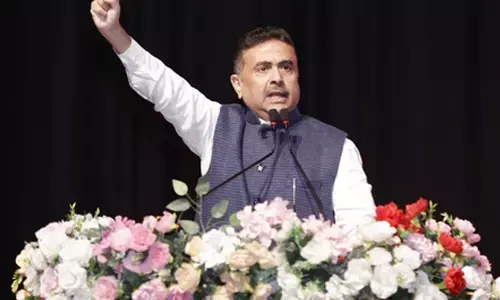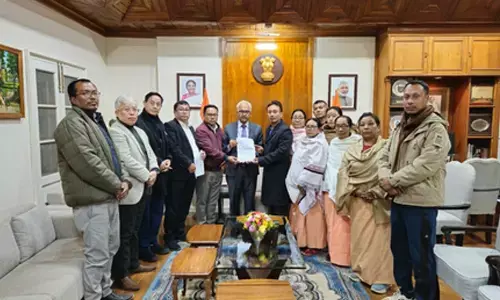Tech ties up loose ends in social sector

Tech ties up loose ends in social sector
Culture of coexistence, transparency and partnership can be significantly enabled by technology
The social sector, comprising non-governmental organisations, social enterprises, CSR regimes and other significant entities has always been an arena for taking stock of, and improving the general well-being of the society and the economy. In recent times, nothing has highlighted the significance of the social sector like the Covid-19 pandemic. It created a crisis that drew responses from the government, civil society, NGOs and other social actors on an unprecedented scale and revitalised our interconnectedness in the world.
However, the social sector does not have the neatest of integrities as there are unchecked divergences among the government, NGOs, corporate social responsibility (CSR) models and social enterprises. Government regulations often limit NGOs, civil society often responds to governments and social actors with hostility. The list of troubles in the social sector is long, and it is worth pondering what could be done to ensure better cooperation among various actors operating in it.
Cooperation in the social sector has acquired new meanings in a co-Covid world. The Indian Express among other sources reported how in March 2020, Prime Minister Narendra Modi called on social welfare organisations and NGOs to assist the government during the lockdown by ensuring basic necessities to the underprivileged, providing medical and protective gear, and helping with awareness campaigns on social distancing. This was barely a small development, as governments and other actors in the social sector often find each other at loggerheads. In 2016, as The Times of India reports, licenses of 20,000 NGOs were cancelled by the government due to alleged violation of the Foreign Contribution Regulation Act (FCRA). Therefore, in times where cooperation is recognised as an utmost necessity and yet, distrust is prevalent among the actors in question, we must devise ways to tidy up the mess and build a cohesive system of association.
The answer to these conundrums must be sought through ways that ensure transparency and collaboration among governments, social enterprises and NGOs. One fruitful direction to take most certainly is technological innovation. While technology energised our lives and kept us afloat during the pandemic, it can most urgently improve coordination and trust within the social sector by facilitating connectivity amongst different parties in question and ensuring that important developments such as changes in regulations and introduction of programmes are effectively communicated.
If governments are apprised of what NGOs, CSR models and enterprises intend to roll out, regulations can be made in accordance with them, and can be implemented while keeping all stakeholders in loop. Such a culture of coexistence, transparency and partnership can be significantly enabled by technology which can counter the material and bureaucratic troubles that burden the social sector.
Technology can be a powerful tool to streamline the finance and transparency aspects in the social sector. As Joy Sharma and Sudeep Gupta note in a December 2018 article on Qrius, social organisations acquire funding through four major sources - the government, donations from individuals, international aid and corporate sponsorships. Regulatory acts often limit international aid, as the quantum of funding received by the Indian social sector from international agencies fell to Rs 6,499 crore in 2016-17, from the Rs 15,299 crore it received in 2014-15. CSRs have helped with funding but the massive funding gap has not been bridged. Furthermore, it is common knowledge that legal and technical loopholes often lead to disputes between NGOs and governments.
Online platforms provide a safe space for seamless flows of funds to NGOs, for CSR activities and to other entities, while keeping track of the money. Technological innovation and digitisation can help keep data in a stable manner and facilitate quick assessments of impact, alongside keeping track of efforts by NGOs and other players in the field. Since all of this happens on platforms accessible to most people, concerns around opaqueness are suitably handled. On a related note, when it comes to impact, as opposed to groundwork and physical campaigns, online campaigns can garner significant amounts of attraction and are a good way to outline what work is being done to the public. This also enables quick feedback and restructuring of programmes based on it. Moreover, technology ensures connectivity with the rest of the world in an era of globalisation and maximises impact across borders, widening the scope for collaboration and influence. All of this counters the major problem of distrust in the sector, as efficiency and transparency are jointly emphasised.
The Bridgespan Group's 2018 report on eight bold philanthropic initiatives in India found that collaboration is a key catalyst for driving social impact. Thus, it can be safely remarked that actors in the social sector, ranging from NGOs to corporate philanthropic ventures acknowledge the need for cooperation, partnership and collusion. Technology can tie the loose ends in such an endeavour by ensuring immediate transparency, efficacy and responsiveness.
Without technology, a locally and globally relevant social sector is unimaginable and all actors in this domain must utilise the wonders it can reap. We must employ technology to elevate impact, minimise hassles and invigorate the social sector, to radically uplift and fashion glorious scenarios for social well-being.
(The author is founder, Upsurge Global, and Senior Advisor,
Telangana State Innovation Cell)














